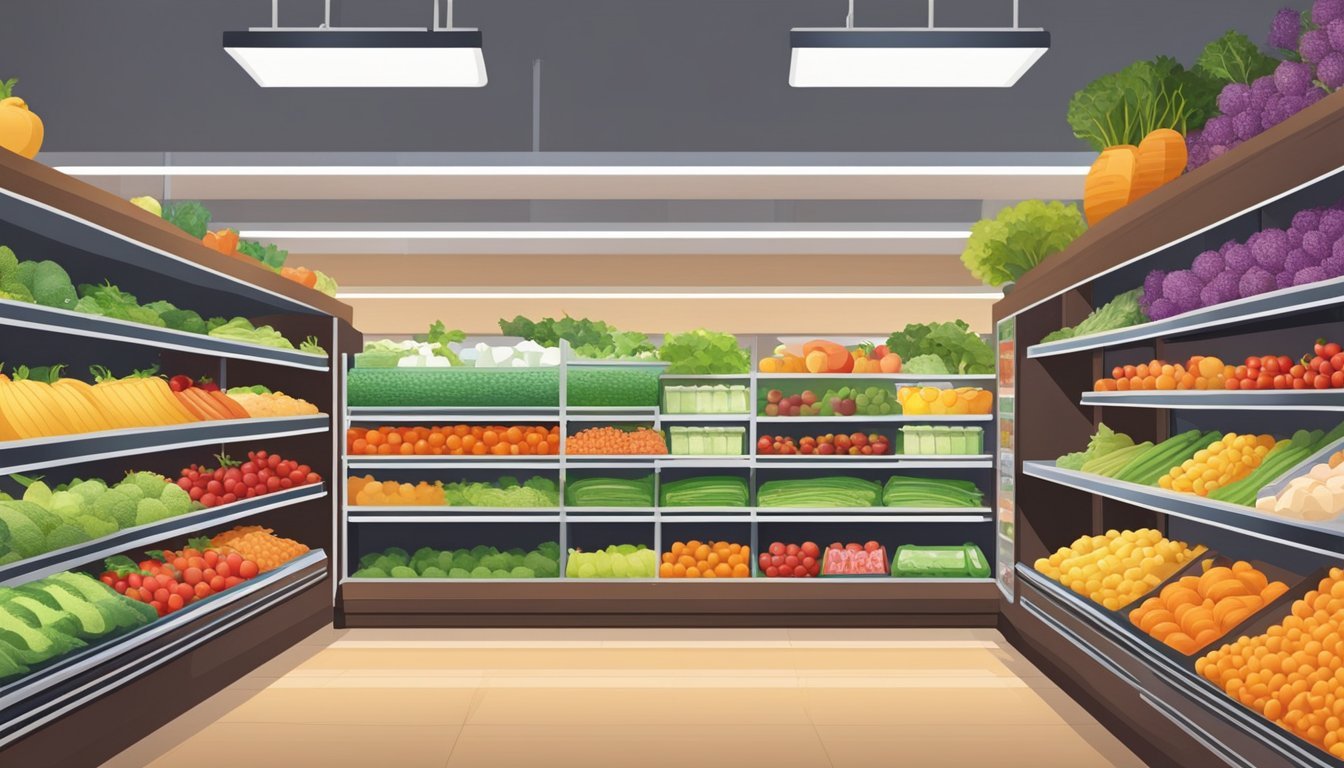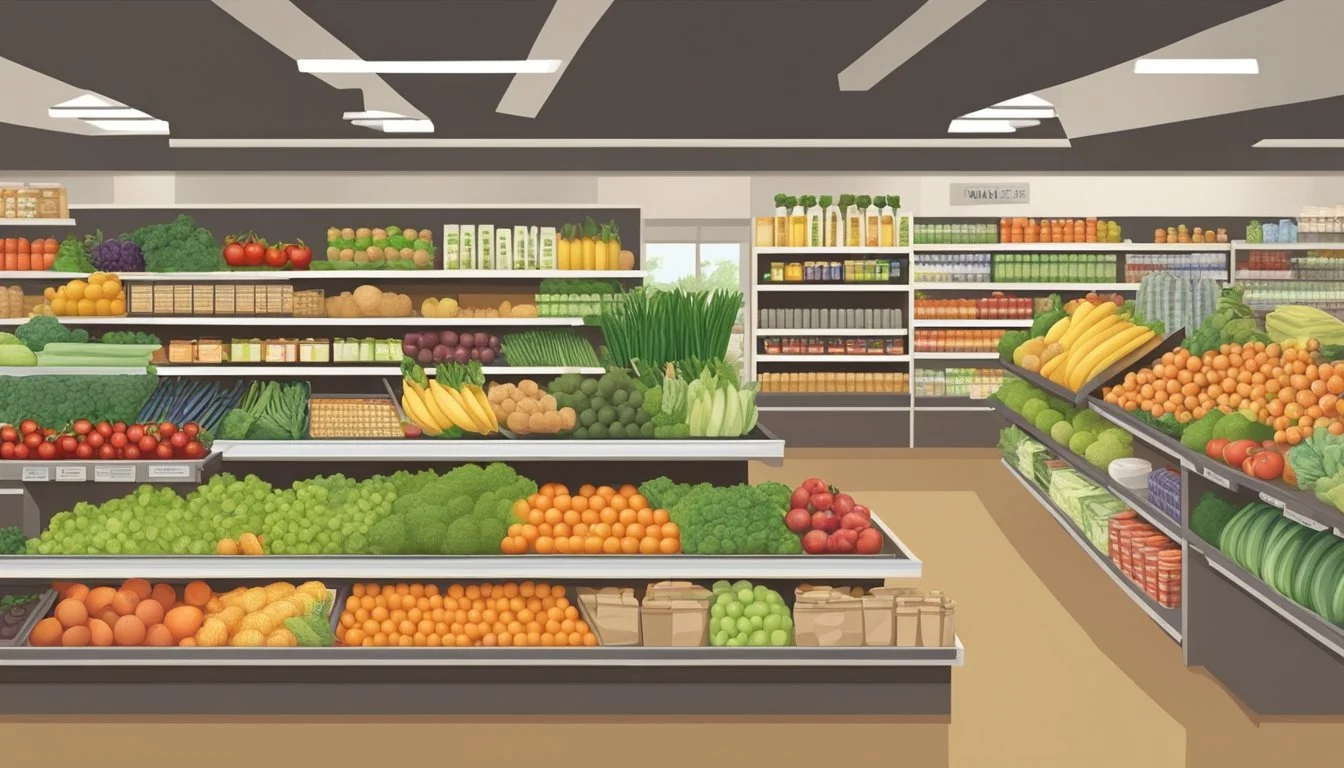Organic Oasis: Top Grocery Stores for Premium Natural and Organic Food
Organic food has become increasingly popular as consumers seek healthier and more sustainable options. Many grocery stores now offer organic products, but some excel in their selection and quality. Whole Foods Market, Sprouts Farmers Market, and Trader Joe's consistently rank among the best grocery stores for organic food in the United States.
These stores provide extensive organic produce sections, featuring fresh fruits and vegetables from local and regional farms. They also offer organic dairy, meats, grains, and packaged goods. Aldi has emerged as a strong contender in the organic market, offering affordable organic options that rival those of more expensive specialty stores.
For shoppers looking to maximize their organic purchases, these grocery chains prioritize organic offerings and often provide informative labeling to help customers make informed choices. They frequently stock lesser-known organic brands and unique products, giving health-conscious consumers a wide array of options to explore.
Understanding Organic Food
Organic food has gained popularity as consumers seek healthier and more environmentally friendly options. The term encompasses a specific set of agricultural practices and standards.
What 'Organic' Means
Organic food is produced without synthetic pesticides, herbicides, or fertilizers. It excludes genetically modified organisms (GMOs) and does not use artificial preservatives, colors, or flavors. Organic farming practices focus on soil and water conservation, as well as promoting biodiversity.
Organic livestock is raised without routine use of antibiotics or growth hormones. These animals must have access to the outdoors and be fed organic feed. Organic dairy products come from animals not treated with synthetic hormones.
The USDA Organic Certification
The United States Department of Agriculture (USDA) oversees organic certification. Products labeled "USDA-certified organic" must meet strict guidelines. These standards cover the entire production process, from seed to shelf.
Farms and processing facilities undergo annual inspections to maintain certification. Products with at least 95% organic ingredients can use the USDA organic seal. Those with 70-94% organic ingredients may be labeled "made with organic ingredients" but cannot use the seal.
Benefits of Eating Organic
Organic food often contains higher levels of certain nutrients, particularly antioxidants. It has lower levels of pesticide residues and may reduce exposure to antibiotic-resistant bacteria.
Organic farming practices benefit the environment by reducing pollution and conserving water. They also promote soil fertility and biodiversity. Many consumers report that organic produce tastes better due to the absence of synthetic chemicals.
Organic food supports animal welfare through more humane livestock practices. It also helps preserve genetic diversity in plant and animal species used for food production.
Top Grocery Stores for Organic Products
Numerous grocery chains now offer extensive organic selections to meet growing consumer demand. These stores prioritize high-quality organic produce, meats, dairy, and packaged goods while maintaining competitive prices.
Whole Foods Market
Whole Foods Market stands out as the first and only certified organic national grocer in the United States. Their stores carry over 41,000 organic products across all departments. Whole Foods adheres to strict quality standards, banning over 100 preservatives and ingredients commonly found in other stores.
The produce section features a wide array of seasonal organic fruits and vegetables. Their meat and seafood departments offer organic, grass-fed, and sustainably sourced options. Whole Foods also carries many organic store-brand products under their 365 Everyday Value line.
While prices can be higher than conventional grocers, Whole Foods offers regular sales and discounts for Amazon Prime members.
Sprouts Farmers Market
Sprouts Farmers Market focuses on fresh, natural, and organic products at affordable prices. Their stores are designed to feel like an old-fashioned farmers market, with produce as the centerpiece.
The bulk foods section allows customers to purchase organic grains, nuts, and dried fruits in customizable quantities. Sprouts carries a large selection of organic meats, including grass-fed beef and free-range chicken.
Their vitamin and supplement department offers many organic options. Sprouts also produces their own line of organic products spanning various categories.
Trader Joe's
Trader Joe's provides a curated selection of organic products at competitive prices. While smaller than some competitors, their stores efficiently use space to offer a diverse organic range.
Popular organic items include produce, dairy, meats, and frozen foods. Trader Joe's private label dominates their shelves, allowing them to keep prices low on organic options.
Their organic produce section, though compact, rotates seasonally. Trader Joe's also carries unique organic snacks and convenience foods not found elsewhere.
Mom's Organic Market
Mom's Organic Market is a regional chain dedicated exclusively to organic and sustainable products. Their strict purchasing standards ensure all items meet or exceed USDA organic regulations.
The produce department features 100% organic fruits and vegetables, including many local options. Mom's carries a wide range of organic meats, sustainable seafood, and plant-based proteins.
Their bulk section offers organic grains, nuts, and snacks. Mom's also focuses on environmentally-friendly household goods and body care products.
Central Market
Central Market, a Texas-based chain, offers an extensive selection of organic and locally-sourced products. Their produce department showcases a variety of organic fruits and vegetables, including hard-to-find specialty items.
The stores feature dedicated organic sections in most departments. Central Market's bakery produces organic breads and pastries daily.
Their "Foodie Finds" program highlights unique organic products from small producers. Central Market also offers organic meal kits and prepared foods for convenient healthy eating.
New Seasons Market
New Seasons Market, primarily located in the Pacific Northwest, emphasizes organic and locally-sourced products. Their produce department features over 200 organic options, with clear labeling to distinguish between conventional and organic items.
The meat and seafood counters offer various organic and sustainably-sourced choices. New Seasons carries a large selection of organic dairy products, including local options.
Their bulk foods section includes many organic items. New Seasons also produces their own line of organic products, ranging from pantry staples to prepared foods.
Geographical Availability of Organic Stores
Organic food stores have expanded their reach across various regions, offering consumers more access to natural and organic products. The availability differs between countries and even within regions of the same country.
US-Based Organic Retailers
Whole Foods Market is a prominent organic retailer with stores across the United States. Aldi has also increased its organic offerings in recent years, particularly in the Midwest. Texas-based Central Market provides a wide selection of organic produce, catering to health-conscious shoppers in the Lone Star State.
Kroger and Walmart have expanded their organic sections, making organic options more accessible in many areas. Natural Grocers focuses on 100% organic produce and has a strong presence in several states.
Farmers markets remain popular for locally-sourced organic goods, especially in urban and suburban areas. These markets often feature seasonal produce and artisanal products from nearby farms.
Organic Food Availability in the UK
London stores offer a diverse range of organic options to cater to the city's health-conscious population. Whole Foods Market has several locations in the capital, providing a wide selection of organic products.
UK-favourite brands like Waitrose and Sainsbury's have expanded their organic ranges to meet growing demand. These supermarkets stock organic produce, dairy, meats, and packaged goods.
Planet Organic, a UK-based chain, specializes in organic and natural products. It has multiple locations in London and offers online shopping for nationwide delivery.
Local and Regional Chains
Regional organic chains play a crucial role in serving specific areas. Sprouts Farmers Market is popular in the Western and Southern United States, offering a mix of conventional and organic products.
The Northeast has chains like Wegmans and Hannaford that have strong organic sections. In the Pacific Northwest, New Seasons Market focuses on local and organic offerings.
Midwestern shoppers can find organic options at Meijer and Fresh Thyme Farmers Market. These stores often partner with local farms to provide fresh, organic produce.
Pricing and Budget Considerations
Organic food prices can vary significantly between stores and products. Strategic shopping and using available discounts can help make organic options more affordable.
Cost Comparison Among Organic Stores
Aldi offers competitive prices on organic products, often undercutting other retailers. Their organic selection includes produce, dairy, and pantry staples at lower costs than many competitors.
Costco provides bulk organic options, which can be cost-effective for larger households or those able to store perishables. Their Kirkland Signature organic line offers quality at reasonable prices.
Kroger's Simple Truth organic brand balances affordability with a wide range of products. Regular sales and digital coupons can further reduce prices on organic items.
How to Use Coupons Effectively
Many stores offer digital coupons for organic products through their apps or websites. Shoppers should check these regularly and load offers onto loyalty cards before shopping.
Manufacturers sometimes provide printable coupons on their websites or social media pages. Combining these with store sales can result in significant savings.
Some stores allow "stacking" - using both store and manufacturer coupons on a single item. This strategy can maximize savings on organic products.
Balancing Quality with Affordability
Prioritize buying organic for the "Dirty Dozen" - produce with the highest pesticide residues. For the "Clean Fifteen," conventional options may be more budget-friendly.
Consider store-brand organic products, which often match national brands in quality but cost less. Aldi's Simply Nature and Kroger's Simple Truth are good examples.
Buying seasonal organic produce can be more affordable. Local farmers' markets may offer competitive prices on fresh, organic items during peak seasons.
Frozen organic fruits and vegetables are often cheaper than fresh and retain similar nutritional value. They're a smart choice for out-of-season items.
Broad Selection of Organic Products
Top organic grocery stores offer an extensive range of certified organic items across multiple categories. These stores cater to health-conscious consumers seeking pesticide-free and non-GMO options for their daily needs.
Diverse Organic Produce
Organic produce sections feature a wide array of fresh fruits and vegetables. Shoppers can find organic strawberries, tomatoes, leafy greens, and root vegetables. Seasonal offerings rotate throughout the year, ensuring variety.
Many stores source from local organic farms when possible. This supports regional agriculture and provides customers with the freshest options available.
Pre-cut organic produce and salad mixes offer convenience for busy shoppers. These ready-to-eat options make it easier to incorporate organic fruits and vegetables into daily meals.
Dairy Products and Meat
Organic dairy aisles stock milk, yogurt, cheese, and butter from grass-fed cows. Plant-based alternatives like almond and oat milk are also available in organic varieties.
Organic meat sections offer chicken, beef, pork, and turkey raised without antibiotics or growth hormones. Free-range and pasture-raised options are often available for those seeking higher animal welfare standards.
Organic eggs from free-range hens provide a protein-rich option for health-conscious consumers. Some stores even carry organic seafood selections for those looking to expand their organic protein choices.
Organic Pantry Staples
Organic cereals, granolas, and oatmeal offer nutritious breakfast options. Whole grain pasta, rice, and quinoa provide the foundation for healthy meals.
Canned goods like beans, tomatoes, and soups are available in organic varieties. Organic condiments, oils, and vinegars allow customers to create flavorful dishes without synthetic additives.
Organic snacks such as chips, crackers, and dried fruits satisfy cravings while adhering to organic standards. Baking enthusiasts can find organic flours, sugars, and chocolate for their homemade treats.
Special Dietary Options in Organic Stores
Organic grocery stores cater to diverse dietary needs with specialized product ranges. These stores offer a wide selection of options for various eating preferences and health requirements.
Gluten-Free and Vegan Products
Organic stores excel in providing gluten-free and vegan options. Shoppers can find an array of gluten-free baked goods, pasta, and snacks made from alternative grains like quinoa and rice. Vegan alternatives abound, including plant-based milk, cheese, and meat substitutes.
Many stores offer dedicated sections for these products, making shopping easier for those with specific dietary needs. Labels clearly indicate gluten-free and vegan status, ensuring customers can make informed choices quickly.
Store staff often receive training on these diets, enabling them to assist customers in finding suitable products. Some stores even offer taste testing events for new gluten-free and vegan items.
Finding Organic Supplements
Organic stores typically feature extensive supplement sections. These include vitamins, minerals, herbal remedies, and protein powders derived from organic sources.
Customers can find supplements free from artificial colors, flavors, and preservatives. Many stores offer knowledgeable staff who can provide information on supplement benefits and usage.
Popular organic supplement options include:
Multivitamins
Probiotics
Omega-3 fatty acids
Plant-based protein powders
Some stores provide in-house nutritionists for personalized supplement advice. They may also stock locally-sourced or small-batch supplements not found in conventional stores.
Availability of Diet-Specific Foods
Organic stores cater to various specialized diets beyond gluten-free and vegan. Paleo, keto, and low-FODMAP dieters can find suitable options in these stores.
For paleo shoppers, stores stock grain-free flours, natural sweeteners, and grass-fed meats. Keto dieters benefit from high-fat, low-carb options like MCT oil and specialty baking mixes.
Low-FODMAP products, crucial for those with certain digestive issues, are increasingly available. These include specially formulated sauces, snacks, and meal bases.
Many stores offer recipe cards or meal planning assistance for these diets. Some even host cooking classes focused on specific dietary needs, helping customers make the most of their specialized product purchases.
Standards and Quality Measures
Organic grocery stores adhere to strict standards and quality measures to ensure the integrity of their products. These guidelines cover everything from food production to labeling, helping consumers make informed choices.
Quality Food Standards and Labels
Organic food standards are regulated by the United States Department of Agriculture (USDA). The USDA Organic seal indicates that a product contains at least 95% organic ingredients. Products labeled "100% organic" must contain only organic ingredients and processing aids.
Other labels to look for include:
"Made with organic ingredients" (at least 70% organic)
"Natural" (minimally processed, no artificial ingredients)
"Non-GMO Project Verified" (no genetically modified organisms)
These labels help consumers identify high-quality organic products quickly and easily while shopping.
Identifying High-Quality Organic Produce
High-quality organic produce should look fresh and vibrant. Colors should be rich and natural, not artificially enhanced. Fruits and vegetables should be firm, without soft spots or blemishes.
When selecting organic produce:
Choose items that are in season for best flavor and nutrition
Look for locally sourced options to support sustainability
Check for proper storage conditions in the store
Organic produce may have slight imperfections, as no synthetic pesticides are used. These minor blemishes don't affect quality or taste.
The Significance of Banned Ingredients
Organic grocery stores prohibit the use of certain ingredients to maintain product integrity. Banned substances include:
Synthetic pesticides and fertilizers
Artificial colors, flavors, and preservatives
Growth hormones and antibiotics in livestock
These restrictions ensure that organic foods are free from potentially harmful chemicals and additives. By avoiding these ingredients, organic grocery stores provide customers with cleaner, more natural food options.
The absence of these substances can lead to enhanced flavor profiles in organic products. It also supports sustainable farming practices and promotes overall environmental health.
Organic Retailers and Sustainability
Organic retailers are increasingly prioritizing sustainability alongside their organic offerings. These stores are implementing eco-friendly practices, supporting local farms, and reducing environmental impact through thoughtful sourcing and operations.
Sustainability Practices at Retailers
Many organic retailers have adopted comprehensive sustainability initiatives. Natural Grocers, for example, has eliminated single-use plastic bags at checkout. This simple step significantly reduces plastic waste.
Some stores have invested in energy-efficient refrigeration and lighting systems to lower their carbon footprint. Others focus on reducing food waste through careful inventory management and partnerships with food banks.
Packaging reduction is another key area. Retailers are encouraging customers to bring reusable containers for bulk items and produce. Some have switched to compostable packaging for prepared foods.
Supporting Local Organic Farms
Organic retailers often prioritize partnerships with local organic farms. This approach reduces transportation emissions and supports regional agriculture.
Many stores feature prominently displayed "local" sections, highlighting produce and products from nearby farms. Some retailers even organize farm tours or meet-the-farmer events to connect customers with local growers.
By providing a reliable market for local organic produce, these retailers help sustain and expand organic farming in their regions. This support is crucial for small-scale organic farmers who may struggle to compete with large industrial operations.
Environmental Impact of Organic Shopping
Choosing organic products at these retailers can have a significant environmental impact. Organic farming practices typically use fewer synthetic pesticides and fertilizers, reducing water pollution and soil degradation.
Organic farms often promote biodiversity by maintaining hedgerows and avoiding monocultures. This approach supports pollinators and other beneficial insects.
Many organic retailers prioritize seasonal produce, which can reduce the energy costs associated with long-distance transportation and storage. Some stores also offer bulk bins for dry goods, allowing customers to reduce packaging waste.
Shopping Experience and Customer Services
Leading organic grocery retailers prioritize convenience and customer satisfaction. They offer various delivery options, create welcoming in-store environments, and provide detailed product information to help shoppers make informed choices.
Ease of Organic Grocery Delivery
Many major retailers now offer convenient delivery services for organic products. Walmart and Target have expanded their organic selections and provide same-day delivery in many areas. Customers can easily order fresh produce, pantry staples, and frozen items through mobile apps or websites.
Some stores partner with third-party delivery services to expand their reach. This allows shoppers to access organic options even if they don't live near a specialty store.
Subscription-based delivery services have also gained popularity. These services curate organic product boxes and deliver them on a regular schedule, saving customers time and effort.
In-Store Customer Experience
Retailers focusing on organic products often create inviting store environments. They use clear signage to highlight organic sections and educate customers about product benefits.
Many stores offer samples of organic items, allowing shoppers to try before they buy. This helps introduce customers to new organic brands and products.
Knowledgeable staff members are crucial for a positive shopping experience. Well-trained employees can answer questions about organic certifications, sourcing, and product uses.
Some stores host events like cooking demonstrations or nutrition workshops to engage customers and promote organic lifestyles.
Retailers with Robust Product Information
Leading organic retailers provide detailed product information both in-store and online. They use shelf tags, QR codes, and mobile apps to share details about organic certifications, sourcing, and nutritional content.
Many stores create dedicated organic product guides or websites. These resources help customers understand the benefits of organic items and how to incorporate them into their diets.
Some retailers partner with third-party verification services to ensure the accuracy of their organic claims. This builds trust with consumers who prioritize transparency in their food choices.
Digital product catalogs allow customers to easily search for organic options and compare products. This feature is particularly useful for those with specific dietary needs or preferences.
Brand Analysis and Product Offerings
Organic grocery stores offer a diverse array of products from established brands and innovative newcomers. These stores cater to health-conscious consumers by providing high-quality, certified organic options across various food categories.
Popular Organic Brands and Products
Organic grocery stores stock well-known brands that have gained consumer trust. Kellogg's offers organic versions of their popular cereals, including cornflakes. Twinings provides organic English Breakfast tea for those seeking a pesticide-free morning brew. Tropicana offers organic orange juice, ensuring a natural start to the day.
Many stores also carry specialty organic brands like Amy's Kitchen for ready-made meals and Nature's Path for breakfast options. These brands often focus exclusively on organic products, appealing to dedicated organic consumers.
Fresh produce sections typically feature a mix of local and national organic brands. Earthbound Farm and Organic Valley are common sights in the produce and dairy aisles, respectively.
Exploring New and Unique Offerings
Organic grocery stores frequently introduce new and unique products to attract and retain customers. These may include exotic fruits, heirloom vegetables, or novel plant-based alternatives.
Some stores offer in-house fermented foods like kombucha or kimchi, catering to the growing interest in probiotic-rich foods. Others might stock locally-sourced honey or specialty nut butters.
Organic snack options have expanded significantly, with brands like Lesser Evil and Bare offering innovative treats like coconut oil popcorn and banana chips.
Own-Label Brands vs. Renowned Brands
Many organic grocery chains have developed their own-label organic brands. Kroger's Simple Truth and Aldi's Simply Nature are examples of store brands that offer organic products at competitive prices.
These private labels often provide a more affordable alternative to well-known organic brands. They typically cover a wide range of products, from pantry staples to fresh produce and dairy.
Renowned brands like Annie's Homegrown or Stonyfield Farm coexist with these store brands, offering consumers a choice between familiar names and budget-friendly options. This variety allows shoppers to mix and match based on their preferences and budget constraints.
Impact of Media on Organic Food Shopping
Media plays a significant role in shaping consumer perceptions and behaviors around organic food shopping. News coverage, influential reports, and social media trends all contribute to raising awareness and driving interest in organic products.
Media Coverage on Organic Retailers
Major news outlets like CNBC and Business Insider frequently report on organic food trends and retailers. Their coverage often highlights the growth of organic sections in mainstream grocery stores and the expansion of organic-focused chains.
These reports can influence consumer perceptions of which retailers offer the best organic selection. For example, Business Insider has featured articles ranking top grocery chains for organic shopping, impacting where health-conscious consumers choose to shop.
Media attention on organic food safety issues or price fluctuations can also sway shopping habits. Positive coverage of a retailer's organic initiatives may boost their reputation and attract new customers seeking healthier options.
Influential Organic Food Reports
Industry reports and scientific studies on organic foods receive substantial media attention. These reports often focus on topics like pesticide residues, nutritional content, and environmental impact.
The Environmental Working Group's annual "Dirty Dozen" and "Clean Fifteen" lists, which rank produce based on pesticide contamination, generate widespread media coverage. These reports can significantly influence which fruits and vegetables consumers choose to buy organic.
Government reports on organic food regulations and labeling also shape public understanding. Media coverage of these reports helps educate consumers on what the "USDA Organic" seal means and how to identify genuine organic products.
The Role of Social Media in Organic Food Trends
Social media platforms have become powerful drivers of organic food trends. Influencers and food bloggers showcase organic recipes and products, reaching millions of followers.
Instagram and Pinterest are particularly influential for visual content featuring organic meals and grocery hauls. These platforms allow consumers to discover new organic brands and share their own experiences.
Facebook groups dedicated to organic living and clean eating create communities where members exchange tips on finding the best organic deals. Twitter serves as a real-time platform for discussions on organic food news and policy debates.
TikTok has emerged as a popular platform for quick organic cooking tutorials and product reviews, especially among younger consumers. This viral content can rapidly boost interest in specific organic items or brands.








